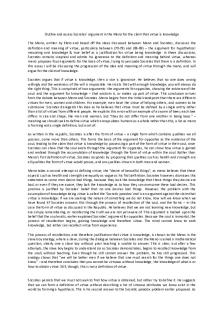Outline and assess the functionalist view that education effectively prepares young people for employment PDF

| Title | Outline and assess the functionalist view that education effectively prepares young people for employment |
|---|---|
| Author | Ellie Smith |
| Course | Sociology |
| Institution | Sheffield Hallam University |
| Pages | 3 |
| File Size | 62 KB |
| File Type | |
| Total Downloads | 26 |
| Total Views | 120 |
Summary
Outline and assess the functionalist view that education effectively prepares young people for employment
24 marks ...
Description
Ellie Smith
Outline and assess the functionalist view that education effectively prepares young people for employment (50 Marks) Different theories and political parties have contrasting views on education and whether it effectively prepares young people for employment. In particular the role of education to prepare young people for work can be seen in the vocational education policies in the UK since the 1970’s. During this time vocational education and training was the responsibility of the employers and vocational education increased dramatically when Thatcher came into power as she tried to tackle the rising youth unemployment by creating more training schemes. She also made all training schemes into NVQ’s and the responsibility of the education department to create standardisation. NVQ’s were job specific qualifications which demonstrated ‘on-the-job’ competencies such as machine sewing and are often studied part time in college. GNVQ’s were also introduced which were usually coursework based and these were an alternative to academic courses such as leisure and tourism or health and social care. These were studied at school but now they have been replaced with vocational GCSE’s and A Levels. In addition to this there were Youth Training Schemes (YTS) which was aimed at school leavers, it combined work experience and education. One problem with Youth training was that employers did not have to pay them minimum wage as they were not proper trained professionals or adults. This is also the case with apprenticeships which involved being at college part time and training at work the rest of the week, at the end of this they would get an NVQ at level 3 which is equivalent to an A level. Functionalists do believe that education effectively prepares young people for employment. Durkheim states that education provides key socialisation such as norms and values through the hidden curriculum which teaches young people to arrive to school and work on time, to be presentable and smart from the use of a school uniform and to respect and be polite to fellow pupils and employees in the future. He also says that as modern societies become more complex, the skills needed of people will be more diverse, an example of this is ICT, nowadays peoples ICT skills have to be adequate for most jobs but this has not always been the case. Davis and Moore emphasise the fact that education is vital for role allocation which is based on meritocracy and equality of opportunity. The education system sifts and sorts through individuals to find which roles best suit them based on merit, for example the most talented gain high qualifications, who then go on to have functionally important jobs with high rewards, this creates the specialised division of labour. Parsons states that education is an important ‘bridge’ to work as it transmits values which are imperative to being successful at work, for example if you’re late to work you could get sacked. He also argues that education gives universalistic and particularistic standards and people achieve their future roles due to merit. Another view of functionalists is that inequalities in education is partly needed because then all of the job roles in society can be filled instead of having everyone good enough for the best jobs. Social policies in the UK have seen the importance of preparing young people for employment and this is true of both labour and conservative policies, for example Youth Training, NVQ’s and GNVQ’s. Furthermore education has gone from employer responsibility to the Department for Educations responsibility which means that young people are not being trained and educated to serve the needs of employers. Although, due to the increase in unemployment, vocational education has increased meaning young people can now choose out of a wide variety of courses for on the job training which is good for employability.
Ellie Smith New Right thinkers also like vocational education as they believe education should serve the needs of the economy and provide workers with skills and attitudes required by employers. Trowler states that the government is concerned about youth unemployment due to the costs of paying out benefits, the social costs such as increased crime and social disorder, as well as a loss of work ethic because of long term unemployment, this is also mentioned by Murray who says that people end up becoming dependent on benefits and lose a desire to work which means there is a growing underclass. Tomlinson argues that the broad thrust of the ‘new vocationalism’ has been built on by more recent New Labour governments which have uncritically accepted the principle that education is to serve the needs of the employers. From 1997 to 2010 the New Labour government was in power and introduced the New Deal for Young People which aimed to reduce youth unemployment. This training initiative was for 18-24 year olds that had been on job seekers allowance for 6 months. They were given personal advisors to help them choose out of 12 months full time education or training, 6 months’ work either in the Environmental Task Force or voluntary, or a subsidized job with one or more days a week training. If they did not choose any of these then their benefits would be cut. Labour also introduced more NVQ’s at level 2 and 3 as well as level 1 for 14-16 year olds. They then tried to create more parity of esteem with academic courses by replacing GNVQ’s with vocational GCSE’s and A Levels which you could access university with. However Marxists strongly disagree with Functionalists and argue that education does not effectively prepare young people for unemployment, but rather exploitation and acceptance of being in a subordinate class. They believe it creates divisions as education is culturally biased towards the middle and upper classes and therefore they succeed while proletariats are continuously oppressed by the bourgeoisie. Paul Willis shows this in his study of working class ‘lads’ called Learning to Labour who ended up with manual jobs. It is argued by Bowles and Gintis that the correspondence principle means skills passed on through the education system are to favour the rich and powerful rather than the whole of society, because institutions teach norms and values such as conformity through the hidden curriculum to produce a passive workforce for the ruling class to keep exploiting in order to maintain their status and wealth. Furthermore the national curriculum was also changed in order for working class people to not question the inequalities in society which can be seen in subjects such as sociology, as well as history being based mainly on British middle class values. Braverman argues that computerisation has actually deskilled white collar and professional jobs, reducing their pay and status as machines are able to do the jobs for them. Finn a Neo-Marxist states that there is a hidden political agenda in vocational training as is produces cheap labour because pay rates for young people are young and they are not fully qualified so do not need to be paid a full wage. Vocational training also undermines the bargaining power of unions because only full time employees can join a union, furthermore it reduces embarrassing unemployment statistics because they are in some form of education and training, as well as reducing crime due to less young people on the streets. Clarke and Willis go on to say that vocational education such as apprenticeships leave individuals in ‘suspended animation’ in which they have a false sense of security that they will get a job after their training. Cohen agrees and states that Youth Training and apprenticeships create ‘good’ attitudes and work discipline rather than actual job skills, as well as the training not leading to a job or promotion afterwards. Feminists also don’t like vocational education as they believe that training schemes fail to break down traditional sex stereotyping. Buswell argues that they are structured to reproduce gender inequalities. In 2006 apprenticeships in hairdressing only contained 6% males and in construction
Ellie Smith only 1% were females. They argue that education channels women into low paid, part time jobs which just reinforces the mother and housewife role on them. However Social Democrats are like Functionalists, they believe that as societies become more complex, education needs to expand and develop to help the next generation be equipped with the appropriate skills, knowledge and attitudes for economic growth and increased wealth. They also believe that education provides equality of opportunity to create a meritocratic society, with the most talented in the most important jobs. However they do believe that there are ways to improve it and the government should take measures to create equality of opportunity and outcome by trying to tackle poverty. Recent views on vocational education has led to them involving more exams than coursework, such as exams being introduced into BTEC’s. In addition to this schools are now only allowed to count one BTEC per child in their schools results, which emphasises the fact that BTEC’s just do not have the same value and therefore there isn’t parity of esteem between vocational courses and academic routes. Overall education does prepare young people for employment as it teaches them essential norms and values for the workplace and vocational education provides invaluable experience due to on the job training. However sociologists fail to agree on whether this is positive or not. Functionalists believe that this is good as it helps with role allocation so everyone has a specific job, but Marxist’s argue and state it only prepares the working class for exploitation and future oppression in the workplace....
Similar Free PDFs

(11) Young people & Crime
- 7 Pages

The View of Saturday Outline
- 3 Pages

Employment Law Outline
- 23 Pages

Employment discrimination outline
- 28 Pages

Education The Case For Support
- 14 Pages
Popular Institutions
- Tinajero National High School - Annex
- Politeknik Caltex Riau
- Yokohama City University
- SGT University
- University of Al-Qadisiyah
- Divine Word College of Vigan
- Techniek College Rotterdam
- Universidade de Santiago
- Universiti Teknologi MARA Cawangan Johor Kampus Pasir Gudang
- Poltekkes Kemenkes Yogyakarta
- Baguio City National High School
- Colegio san marcos
- preparatoria uno
- Centro de Bachillerato Tecnológico Industrial y de Servicios No. 107
- Dalian Maritime University
- Quang Trung Secondary School
- Colegio Tecnológico en Informática
- Corporación Regional de Educación Superior
- Grupo CEDVA
- Dar Al Uloom University
- Centro de Estudios Preuniversitarios de la Universidad Nacional de Ingeniería
- 上智大学
- Aakash International School, Nuna Majara
- San Felipe Neri Catholic School
- Kang Chiao International School - New Taipei City
- Misamis Occidental National High School
- Institución Educativa Escuela Normal Juan Ladrilleros
- Kolehiyo ng Pantukan
- Batanes State College
- Instituto Continental
- Sekolah Menengah Kejuruan Kesehatan Kaltara (Tarakan)
- Colegio de La Inmaculada Concepcion - Cebu










